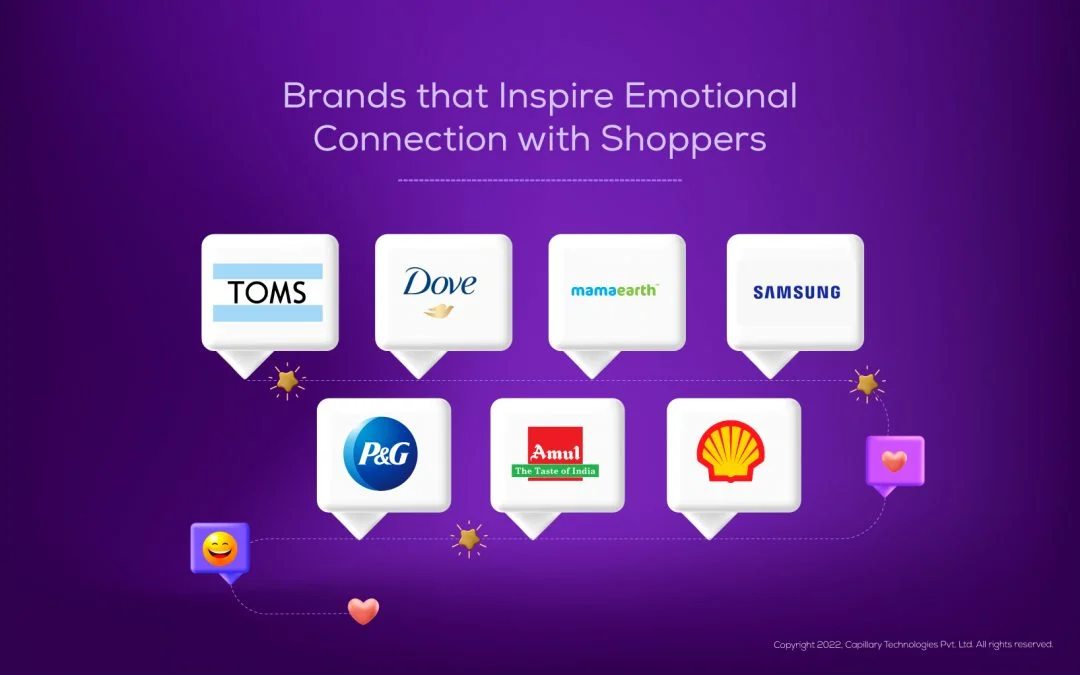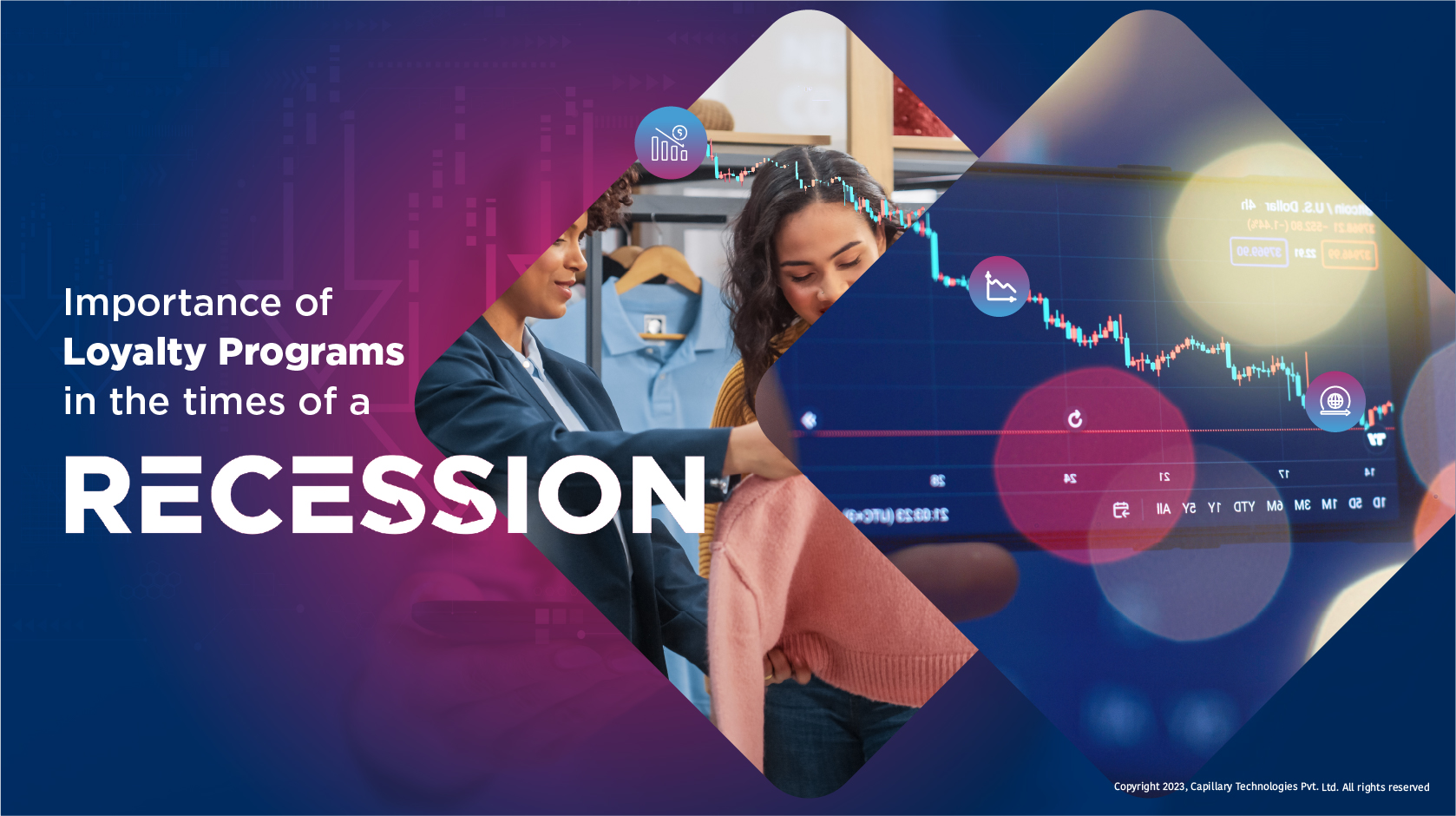- Design industry shaping loyalty programs
- Integrate easily and go live quicker
- Deliver hyper-personalized consumer experiences
Blue Rewards from Al Futtaim Group Shares Loyalty Success Stories and Evolution. Watch Podcast >
Capillary Announces 2nd Annual Captivate 2025 Summit: Transforming Loyalty Management with New AI Tech Read more >

“Emotionally connected customers spend up to 2x or more with their preferred retailers”
– States a Motista reasearch paper.
These numbers tell that customers expect brands to know their preferences and understand what they want & when. However, collecting customer reviews and knowing their preferences isn’t that easy. Brands need to work hard on earning shoppers’ trust and making them feel valued by resolving their issues and listening to feedback continuously. The tone of interaction truly makes a difference in building brand emotional connection and loyalty.
It’s time to infuse human experience into your brand if you haven’t yet. Wondering how you can make it happen? At Capillary, we’ve worked with 250+ brands across the globe which has resulted in a lot of insights. Here, we share some of the best brand emotional loyalty campaigns that have successfully worked for brands.
One of the world’s most recognizable beauty brands, Dove, made its way into women’s hearts with its Self Esteem Project. With this project, the brand pledged to empower young people to boost their self-confidence by breaking beauty biases. Under the project, Dove has been helping parents, mentors, teachers, and young leaders deliver self-esteem education for over a decade now. And, with their constant efforts, they’ve reached more than 82 million people. In addition to their educate the customer & build an awareness campaign, the brand took initiatives to support regional customers as well.
Their #TheBeautyTestStopsWithMe movement in India, a sequel to their wildly successful #StopTheBeautyTest movement, reaches into the hearts of mothers and daughters all across the subcontinent. It stands stronger in support of the arranged marriage reality in India, where women face matrimonial rejection for their looks. Per the campaign, Dove urges mothers who’ve faced such rejections to share their stories, dubbed “Mothermonials”, and challenge society in order to break the cycle and not let their daughters be treated as commodities, valued only by their looks. The campaign is woven around the idea of women accepting the beauty within – no matter their size, shape, or color. It’s empowering the audience with the confidence to accept the real beauty and not just what’s on the surface.
“When you buy TOMS, you help fund access to mental health resources for the millions of people who need them,” reads the Impact page on Toms.com. TOMS shoes has followed an impact model to contribute to the community via which it shares ⅓ of its profits for grassroots good. It includes cash grants and partnerships with community organizations to drive sustainable changes and build more inclusive and diverse communities.
TOMS Shoes is a perfect example of a brand that takes the right blend of rational & emotional approaches to bridge the gap between its shoppers & the brand. TOMS is a B Corporation-certified company that supports sustainable living with greener packaging, greater use of sustainable cotton, and reduced carbon footprints. The brand supports the community, raising mental health awareness, ending gun violence, and working strongly to become an anti-racist organization with its partners. You can explore more of their approach & initiatives here.
Levi’s, an American clothing brand, took the initiative to plant a tree for every download of the Levi’s app in April 2021. In partnership with an NGO – Tree Nation, they realized this mission to promote afforestation and biodiversity protection. Since the launch of this initiative, they’ve planted over 30,000 trees in Madagascar. Per their metrics, since then, trees have captured over 900 tonnes of CO2!
Motivated by the same, the brand is taking the journey of plantation ahead and inspiring consumers worldwide to join this mission with them. One of the crucial benefits of the plant-a-tree campaign is you can contribute to the global cause simply by becoming a member of Levi’s and downloading an app. This gives more power to customers and raises the belief of the brand is responsible toward the community.
Some brands believe in growing as a community, and P&G is surely leading among them. Being a trusted choice of more than 5 billion people in nearly 70 countries, it is committed to being the world’s most socially responsible company. The brand supports environmental sustainability by carbon footprint reduction campaigns like protecting forests, ensuring eco-friendly packaging, and educating employees to integrate sustainability into business plans.
Their CSR program P&G Shiksha drove a huge community impact for more than 4.5 million students across 2000 schools. Moreover, P&G readily contributed to families that suffered Kerala floods in 2018, cyclone FANI & floods in western India in 2019. During the COVID pandemic, they continued supporting access to education for underprivileged children, despite schools being shutdown. Within the organization, the brand voices gender equality and diversity & inclusion, having a team of 145 nationalities.
An act of goodness is meant to get the audience’s attention and contribute to the community for the greater good. Samsung Good Vibes is one such app Samsung built to ease communication for deafblind people. It lets users send messages using Morse Code simply by tapping on the screen, which deafblind users can do by sensing the vibrations. Of course, the app is available for people with normal sight & hearing as well to ease communications within the community both ways.
Unlike typical emotional marketing examples, Samsung touched upon an entire idea to creatively use its services to help the community as well as widen the client base. Though it hasn’t gotten much adoption, the idea helped sensitize people and certainly created an emotional appeal.
A household name in India and increasingly across the world, Amul is known for its humorous and sometimes satirical takes on current events. The Amil Girl, as the mascot is known, was created in 1966, and she’s played a key role in the ads that have been simple yet extremely powerful commentary on current events.
Amul’s consistent ad campaign over the past 25 years has created such a strong emotional bond that it can be termed an impactful loyalty campaign. There’s no direct selling, the ads are honest and humorous, and that is what clicks with the people. Whenever in a shop trying to decide which butter to buy, if there’s the Amul girl on the cover of one packet, customers are most likely to buy that packet.
Knowing your customers’ interests and blending your company’s offerings around it rightly can create miracles for any business. No one understood this better than Shell plc. They recognized their audience’s craze for Doctor Strange and surprised them by planning a giveaway campaign around. Doctor Strange Multiverse of Madness promo offered Doctor Strange merchandise (caps, backpacks, pin badges, movie gift cards), discount coupons & free movie tickets on using their services. The promo was roughly planned for a month before the movie, and of course, it was hugely successful. The idea unveiled the secret society of marvel fans and helped Shell in earning more brand fans & add new customers nationwide.
It takes time to earn trust, get brand-loyal customers, and build an emotional connection. And, if you give your customers enough time, attention, and consistently improve shopper experiences, you will gradually find them turning brand loyal.
To build brand emotional connection and loyalty, you need not wait for your target audience to be your customers. You can consider emotions as one of the crucial marketing strategies even at the brand awareness stage like what BMW in the 1970s used in its slogan ‘The Ultimate Driving Machine’ which is now changed to ‘Sheer Driving Pleasure. Think about the strong emotions you can evoke among people and design a program around it.
Are you considering incorporating an emotional approach to tie a virtual knot with your customers? If your response is affirmative, our loyalty and engagement experts are here to brainstorm the best path forward.
Emotional loyalty campaigns focus on creating a deep connection between a brand and its customers. These campaigns, like the emotional branding examples shared above, go beyond transactional rewards to foster trust, love, and commitment towards the brand.
Brands that use emotional branding benefit from building more robust and resilient customer relationships. Customers who feel a brand emotional connection are more likely to be loyal, advocate for the brand, and make repeat purchases.
Examples include Dove’s Real Beauty campaign, Apple’s community-building initiatives, and Nike’s motivational messaging. These emotional marketing examples effectively enhance customer emotional loyalty by creating connections at a deeper level.
Challenges include accurately understanding customer emotions, creating authentic and impactful messaging, and maintaining consistent meaningful engagement. Brands must also ensure that their emotional loyalty campaigns resonate across different customer segments.

December 3, 2024 | 5 Min Read
Trying to build a strong emotional connection and long-lasti

January 29, 2025 | 5 Min Read
During an economic downturn, retaining customers is more cru